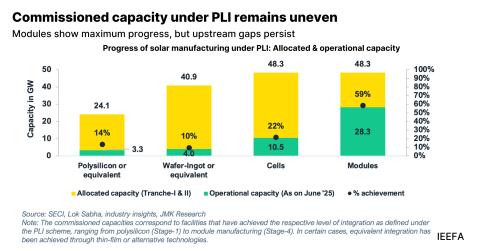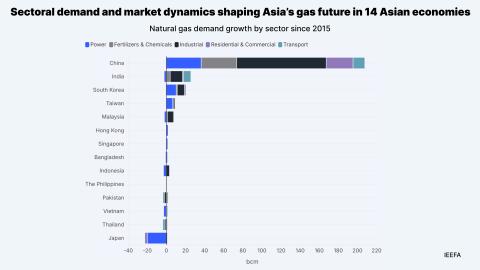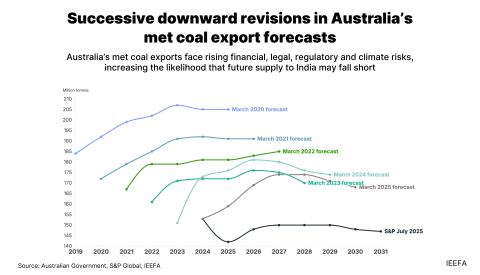IEEFA and environmental groups warn CalPERS/CalSTRS about climate risk
June 25, 2019 (IEEFA U.S.) ̶ Anticipating the first reporting deadline for a comprehensive analysis of climate-related financial risk in the portfolios of the two largest public pension funds in the nation, five influential NGOs are proposing reporting scenarios designed to move institutional investors toward greater accountability to members, beneficiaries, and the financial markets.
In 2018, the California legislature passed, and Governor Jerry Brown signed, Senate Bill 964 (Allen, D-Santa Monica), the first bill in the nation to define “climate-related financial risk”* in law and require institutional investors to assess that risk in their portfolios. SB 964’s requirements are specific to the California Public Employees’ Retirement System (CalPERS) and the California State Teachers’ Retirement System (CalSTRS), the two largest public pension funds in the nation. Together, the funds manage nearly $600 billion in equities, real estate, and infrastructure investments. The first comprehensive reports on climate risk to the funds’ portfolios are required by January 1, 2020—and it is the completeness and adequacy of those reports that concern the groups in their correspondence.
Best-practice recommendations for how CalPERS/CalSTRS should report on climate risk, and comply with SB 964
In their letters to CalPERS and CalSTRS, the Institute for Energy Economics and Financial Analysis (IEEFA), Center for International Environmental Law (CIEL), Union of Concerned Scientists, Environment California, and Fossil Free California provide best-practice recommendations for how the two funds should report on climate-related financial risk, in order to comply with SB 964 and avoid legal liability.
“When reporting on the risks climate change poses to their portfolios, pension funds must particularly focus on the energy sector and the urgent need to reduce emissions to net-zero by mid-century,” said Nicole Pinko of Union of Concerned Scientists. “This is essential if energy companies are to be in alignment with the Paris climate agreement’s goal of keeping global average temperature increase well below 2 degrees Celsius (2°C) and striving to limit it to 1.5°C above pre-industrial levels.”
Environment California and Fossil Free California, co-sponsors of SB 964, propose a detailed analysis of fund holdings based on the recommendations of the Task Force on Climate-Related Financial Disclosures (TCFD), established in Paris in 2015 to develop consistent reporting parameters for businesses and financial institutions. “SB 964’s reporting requirement gives the investment community an opportunity to see how the TCFD reporting recommendations apply to financial markets impacted by climate change,” said Janet Cox of Fossil Free California. “While compliance with the guidelines is technically voluntary, having this information is actually essential for investors concerned about climate risk to their portfolios.”
Heightened risks and lower returns as cheap gas and renewables play havoc with stock performance
Tom Sanzillo, Director of Finance at the Institute for Energy Economics and Financial Analysis, defended the extensive requirements of the law, noting the wide-ranging ramifications of a changing climate. He said, “California’s pension funds are being asked to take into account climate risk as a key component of their investment strategy. The new legal requirement comes during a time of heightened risks and lower returns in the fossil fuel sector as cheap gas and renewables play havoc with stock performance. While the diligence required to comply with the California statute may seem burdensome to some, it is a reality check on the financial risks and fragility of the industry as a whole.”
Steven Feit, Staff Attorney at the Center for International Environmental Law (CIEL), focused on the fiduciary duty of pension funds’ board members. “For those managing pension funds, monitoring how climate change impacts these investments is more than just good business sense; it’s a legal duty. Public pension fund fiduciaries should be actively monitoring their portfolios to ensure pensioners’ investments are protected as climate change worsens and the world transforms to a clean-energy economy. Now, SB 964 has made this obligation even more explicit for California’s pension funds,” he said.
Feit also noted that board members’ responsibility goes beyond simply acknowledging climate risk. “If the board members of pension funds fail to adequately consider the financial risks posed by climate change and report these to the public, that could be a breach of their legal duties. SB 964 gives trustees an opportunity to demonstrate to beneficiaries that they’re taking climate-related financial risk seriously. If CalPERS and CalSTRS don’t adequately report how these risks could affect their pension fund portfolios, that should be a warning sign for concerned beneficiaries — and could even open them up to legal claims.”
*Some background for editors:
- “Climate-related financial risk” refers to the risk that the changing climate and the transition to a low-carbon economy pose to investments. Because they operate over long time horizons, pension funds face particular risks to their investment returns from climate change. For example, the Paris agreement has accelerated new regulations, reduced demand for the most carbon-intensive fossil fuels, and rewritten standard investment assumptions about the future profitability of coal, oil, and gas. In addition, the physical impacts of climate change could affect many classes of investments that are typically included within a pension fund’s portfolio.
- Trustees of pension funds have legal obligations, commonly referred to as fiduciary duties, to manage the assets under their care prudently and loyally, and to monitor their investments to ensure they remain prudent.
Media contacts
IEEFA: Vivienne Heston, [email protected], (914) 439-8921, @ieefa_institute
Center for International Environmental Law: Steven Feit, [email protected], (202) 742-5849
Fossil Free California and Environment California: Janet Cox, [email protected], (415) 902-1795
Union of Concerned Scientists: Abby Figueroa, [email protected], (510) 909-1564
About IEEFA
The Institute for Energy Economics and Financial Analysis (IEEFA) conducts global research and analyses on financial and economic issues related to energy and the environment. The Institute’s mission is to accelerate the transition to a diverse, sustainable and profitable energy economy.










